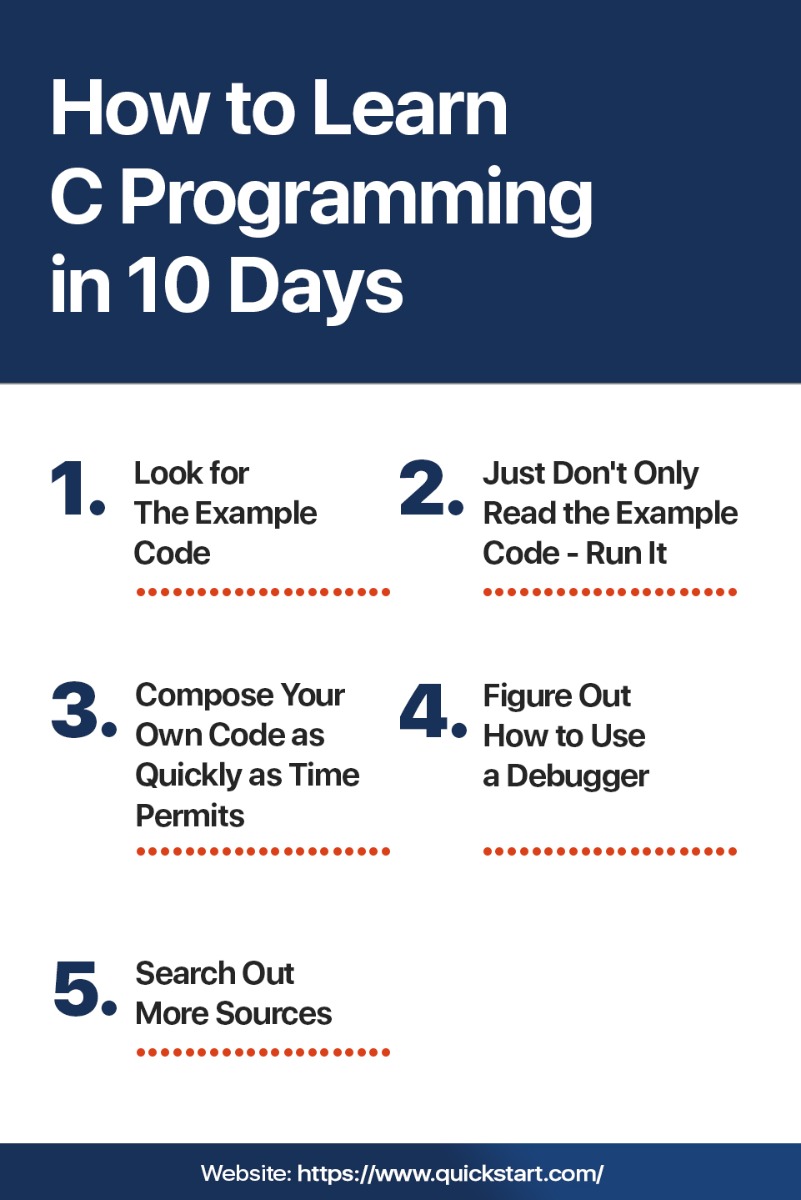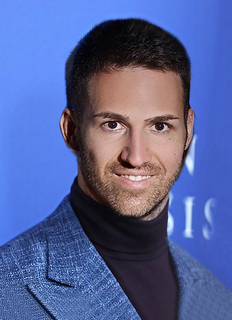Connect with our experts for counseling on your next step to succeed in your career. Start your 30-day free trial to access over 900 self-paced courses.

How to Learn C Programming in 10 Days - 2021 Edition
The C programming language was initially created for and actualized by Dennis Ritchie on the UNIX operating system. The C language, which is very basic, isn't attached to specific hardware or framework. This makes it simpler for a client to compose programs that will run without many (or any) progressions on essentially all machines.
The C language is frequently called a middle-level computer language, as it consolidates the components of high-level languages with the functionalism of assembly language. C programming permits the control of bits, bytes and addresses, giving the programmer more command over precisely how the program will act and more straightforward admittance to the mechanics of the fundamental hardware. Connect with our experts to learn about our IT certifications.
C was made, impacted, and field-tried by working programmers. The outcome is that C gives the programmer what the programmer needs.
Why Do I Need To Learn C?
C is as yet one of the most famous programming languages out there. The linguistic structure and ideas of C, particularly, has stood the trial of time, and you can see them being carried on to other mainstream programming languages, even the advanced ones, for example, Go.
Regardless of whether you will design web applications or extravagant web front-end segments for the remainder of your life, learning C will assist you with seeing how software and hardware really cooperate.
C specifically controls much more technology than we give it kudos for.
Then again, a portion of your #1 software - potentially even the internet browser you are perusing this article on—is based on C++. Realizing C is a decent base, yet much of the time, software development will expect you to learn C++ and its standards.
If you need to develop software that requires to make the most out of a computer's performance and capacities—top of the line work area games, modern efficiency tools, or complex computation-based programs, for example—or on the off chance that you simply need a programming language that allows you to collaborate with a computer's hardware straightforwardly, C is the language for you.
All in all, for what reason would you not have any desire to learn C? Unlike 25 years back, when you may have needed to put resources into a restrictive compiler to begin, today you can unquestionably learn C for free.
Ways You Can Learn Programming Faster

1. Always Look for the Example Code
Figuring out how to program is about code. When you're first figuring out how to program, you should try to take a gander at, and attempt to see, each model. At the point when I initially figured out how to program, I would at times peruse the code example before the content and attempt to sort out what they did. It doesn't generally work, yet it constrained me to take a gander at the example cautiously, and it frequently helped make the programs clearer.
2. Just Don't Only Read the Example Code - Run It
Yet, when you're reading a programming guide/tutorial (or book), it's anything but difficult to take a gander at the example code and state “I get it, I get it, that bodes well.” Obviously, you may get it, yet you probably won't get it, and you simply don't have any experience with it. There's just a single method to discover - accomplish something with that code.
At that point, type the example code into a compiler. If you type it, rather than reordering it, you will truly constrain yourself to experience all that is there. Composing the code will drive you to focus on the subtleties of the sentence structure of the language—things like those entertaining semicolons that appear to pursue each line.
Then compile it and run it. Ensure it does what you figure it does.
At that point, change it. Software is the most handily changed hardware on earth. You can analyze effectively, attempt new things, see what occurs; the progressions will happen very quickly, and there is no danger of death or anarchy. The most effortless approach to learning new language highlights is to take some code that works one way and change it.
3. Compose Your Own Code as Quickly as Time Permits
When you comprehend something about the language—or regardless of whether you're actually getting your head around it—begin composing test programs that utilize it. Now and again it's elusive to see what programs to compose. That is OK, you don't need to think of each thought toward the start.
You can likewise re-implement the examples from the book or instructional exercise you are reading. Attempt to do as such without glancing back at the example code; it won't be as simple as it appears. This procedure can function well if you change the example code.
If you can't think about a little program to compose, yet you have as a main priority a bigger program you need to actualize, similar to a game, you could begin assembling little pieces that you can later use for a game. If you use them later, you will get a similar helpful experience.
4. Figure Out How to Use a Debugger
The sooner you learn great troubleshooting methods, the simpler it will be to figure out how to program.
The initial phase in doing so is to figure out how to utilize an IDE or tool called a debugger, which permits you to venture through your code.
A debugger will permit you to step line by line through a bit of code. It will allow you to see the estimations of factors and whether the code inside an “if statement” is executed.
A debugger can assist you with addressing inquiries regarding what your code is doing.
The last word about debuggers: In the first occasion when you find out about a debugger, it will take you longer to fix the issues with your code. After the 10th or so bug, it will truly begin to pay off. Furthermore, trust me, you will have far more than 10 bugs in your programming profession.
I regularly observed students reluctant to utilize a debugger. These understudies truly made life hard on themselves, taking ages to discover straightforward bugs. The sooner you figure out how to utilize a debugger, the sooner it will pay off.
5. Search Out More Sources
If you don't get something, there's a decent chance how it was clarified simply didn't click.
To start with, search for elective clarifications. The web is loaded up with data about programming, and a few clarifications turn out better for various individuals; you may require pictures, another person may not. There are additionally loads of good books with point-by-point clarifications.
Yet, if that doesn't work, the most effortless approach to sort out where your misconception lies is to ask another person. Yet, attempt to go past saying, "I don't comprehend. It would be ideal if you clarify." You're probably going to get a connection back to a similar content you didn't comprehend. All things considered, reword your comprehension of the content in your words. The more your inquiry uncovers about your opinion, the simpler it will be for a proficient master to respond to it. Programmers at times have gained notoriety for being cantankerous about addressing questions, however, I think the explanation is that they need to gain ground in a discussion, and that requires the two sides to invest effort. If you ask a savvy, nitty-gritty inquiry that shows you are figuring, you will by and large get great outcomes.
Pathway to Follow for Learning the C Language in 10 Days
In this blog, we will examine the intensive educational plan or pathway that one should follow to learn C in only 10 days!
Enroll in our Coding Bootcamp program to learn web development and programming.
1. Prologue To C Language (Day: 1)
The most important thing you need to do is comprehend the idea of C language! You're needed to experience the basics of the C language, such as the birthplace of the programming language, its highlights and applications, how to incorporate and run a C program, and so on. Besides, you need to make your first C program also to improve comprehension of C programming. In this underlying stage, you're needed to get acquainted with the rudiments of the language as much as could reasonably be expected!
2. Experience Variables, Data Types, and Operators (Day: 2)
While learning a new language, you have to think about the factors, how to characterize and store them, how to perform sensible and numerical tasks (operators), and so on preceding some other programming ideas. These themes can be considered as the essential need to learn C programming abilities. In the interim, you need to cover here a few other related themes also, such as how variables are used in C language, how to typecast in C, sorts of operators, and so forth.
3. Comprehend the Control Flow Statements (Day: 3)
Presently, it's an ideal opportunity to comprehend the cycle that controls the progression of a program's execution. You should realize what the control statements are and how to actualize them. There are different concerning themes, such as Loops, Conditional and Jump Statements, and some more. After having a comprehension of these ideas, you can choose their usage through settling programming questions and making essential programs. To cover a few extra themes like Continue Statement, Switch Statements, Break Statement, and so forth for more explanation.
4. Learn String Handling and Array in C (Day: 4)
In the wake of experiencing the control flow statements, presently you're needed to think about Arrays and String Handling in C. An array is an assortment of information that holds a set number of estimations of a similar kind while Strings are really a one-dimensional array of characters ended by an invalid character '\0'. You need to see how to proclaim an Array and access its components, what are string library functions, multidimensional arrays, and other applicable themes.
5. Explore Functions in C (Day: 5-6)
When you complete the previously mentioned topics, you need to think about the mainstay of the C programming language. A Function is a square of code that plays out a particular task or calculation. You need to think about client characterized and function models in C, standard library functions, function calling – call by reference and call by value and different others. In the interim, you're likewise needed to experience a few other vital topics, such as recursion, storage class, and so on to comprehend the functions in C adequately.
6. Find Out About Pointers, Unions, and Structures, (Day: 7)
Alright, we should plunge further into the universe of C programming with some more top to bottom ideas like Structures, Pointers, Unions, and more. To put it plainly, a Pointer is a variable that stores the location of another variable or a memory area. Also, Structures, Enum, Union, and so on are the client characterized information type that have their own determinations and functionalities. You need to think about how to declare and initialize Pointers, Double Pointer, how to define Structure and Union, and other related ideas.
7. Comprehend Dynamic Memory Allocation and Linkedlist (Day: 8)
You also need to comprehend the ideas like Dynamic allocation of memory, LinkedList, and so forth. The DMA is the way toward assigning memory physically during run-time. You're needed to learn DMA in C utilizing calloc(), malloc(), realloc() and free(). Also, a LinkedList is a direct information structure where every node contains an information field and a reference to the following node in the list. You likewise need to cover a few other suitable information structures, such as Stack, Queue, and so forth, as Data Structure is the foundation of every language.
8. Find Out About File Management And Preprocessors In C (Day: 9-10)
Ultimately, you're needed to get an exhaustive comprehension of File Management and Preprocessors in C language. You need to think about C Preprocessor which is utilized consequently to change your program before real compilation. It will likewise assist you with understanding the design of C programming. File Handling in C worries with different activities, for example, how to create, open, read, write, move, and close a file. You are needed to find out about the functions utilized for playing out these tasks, and so forth.
In the wake of following the above-given pathway, you'll have the option to execute and feature your abilities in the C language to accomplish your career objectives. Likewise, the educational program isn't excessively intricate or tedious to follow, as all you require is to experience a few subjects every day and you'll cover the whole schedule in basically 10 days. Along these lines, plunge into the C language world and improve your programming abilities for new job openings!
